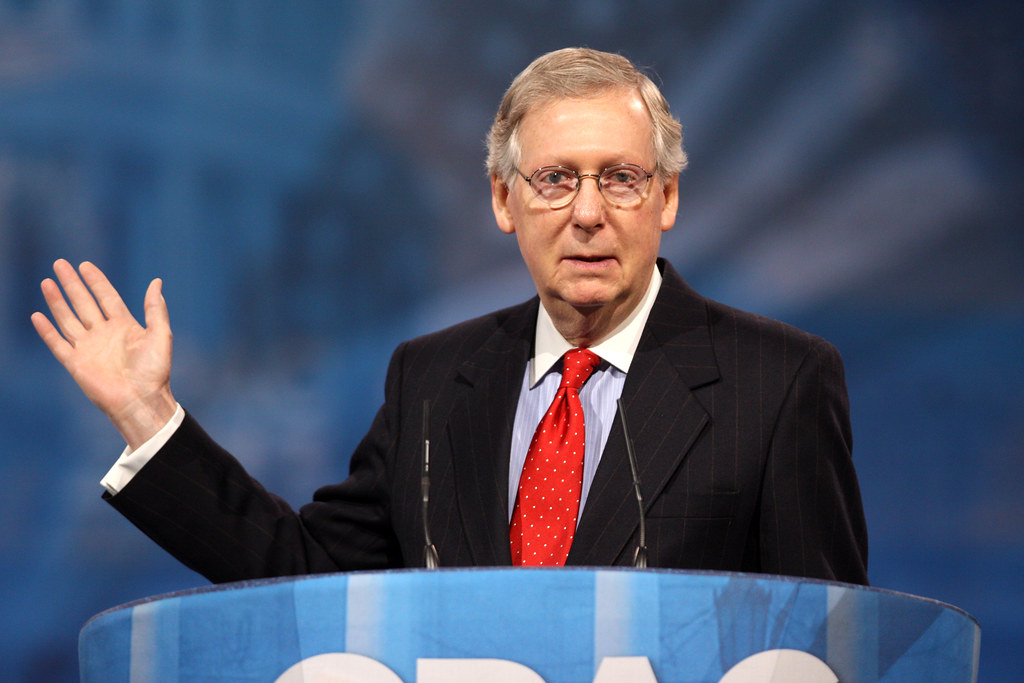Mitch McConnell attempts to fool Democrats by endorsing Merrick Garland to replace James Comey as the Director of the FBI.
Senate Majority Leader Mitch McConnell is putting his support behind former Supreme Court nominee Merrick Garland to replace James Comey as the Director of the FBI.
Asked who he might recommend to head the FBI, McConnell told Bloomberg’s Kevin Cirilli on “Bloomberg Daybreak: Americas,” that he had already spoken to Trump.
CIRILLI: “There is a lot of attention now on who the president will select to nominate to replace former FBI director James Comey. Have you spoken with the president about this and who would you recommend?”
MCCONNELL: “Yeah, actually I have spoken with the president about it. I recommended Merrick Garland. It may surprise people, but he has a deep background in criminal law, he was the prosecutor in the Oklahoma City bombing case and I think it would make it clear that President Trump will continue the tradition at the FBI of having an apolitical professional.”
As The Hill reports, “The endorsement was an about-face for McConnell, who was instrumental in blocking former President Obama’s attempt to confirm Garland to the Supreme Court last year by refusing to hold hearings or votes on the judge.”
However, there could be an alternative motive for McConnell throwing his support behind Garland.
As The Hill adds, “Democrats are unlikely to accept Garland trading his lifetime appointment on the influential U.S. Court of Appeals for the District of Columbia for a ten-year FBI director appointment that Trump could cut short at any time by firing him.”
Politico supports that analysis as well, reporting that:
While Republicans have framed Garland as a figure who could get bipartisan support in the Senate, nominating Garland would give the president an opening to appoint someone to the D.C. Circuit, the most powerful court aside from the Supreme Court. There are currently seven Democratic and four Republican appointees on the court.
McConnell didn’t address the court vacancy that would open up but insisted “it would be good to have Democratic support” on a new FBI director nominee.
The Independent reports that the move would likely be a bad one for Merrick:
Mr. Garland currently serves as the chief justice on the DC Circuit federal appeals court, a position that is a lifetime appointment. Choosing to walk away from that position — a leading spot on one of the most powerful courts in the country — for a job that would leave him at the mercy of the whims of President Donald Trump, may not be the perfect choice for the judge, even if Democrats have said it sounds like a good idea following his being snubbed by Senate Republicans on his nomination to the Supreme Court last year.
Thankfully, NPR reports that “Two friends of Judge Merrick Garland tell NPR’s Carrie Johnson that he loves being a judge and he intends to remain on the bench.”
While the D.C. Circuit has the smallest geographic jurisdiction of any of the U.S. Courts of Appeals, it is considered the most important appellate court.
Current Chief Justice of the U.S. Supreme Court John G. Roberts, who served for two years on the D.C. Circuit, spoke of the importance of that court in a lecture published by the Virginia Law Review in 2006 titled: “What Makes the D.C. Circuit Different? A Historical View.”
Wikipedia summarizes Roberts’ lecture, writing:
[The D.C. Circuit] is given the responsibility of directly reviewing the decisions and rule making of many federal independent agencies of the United States government based in the national capital, often without prior hearing by a district court. Aside from the agencies whose statutes explicitly direct review by the D.C. Circuit, the court typically hears cases from other agencies under the more general jurisdiction granted to the Courts of Appeals under the Administrative Procedure Act. Given the broad areas over which federal agencies have power, this often gives the judges of the D.C. Circuit a central role in affecting national U.S. policy and law. Because of this, the D.C. Circuit is often referred to as the second most powerful court in the United States, second only to the Supreme Court.


You must be logged in to post a comment Login